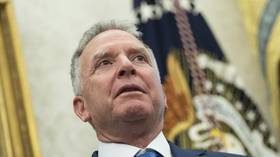German living standards in ‘unprecedented post-WW2 slump’ – report

Germany's 2022 living standards took the biggest downturn since World War II, a report released by the Forum for a New Economy on Monday has suggested. The decline is attributed to the energy shocks that sent prices for consumers soaring.
Economists from the Berlin-based think-tank highlighted that the decline in Germany’s economic output recorded in 2022 is comparable to the financial crisis of 2008 and the short-lived decline during the Covid-19 pandemic in 2020.
The failure to protect the country’s industrial sector from energy price spikes is expected to turn the 2020s into “a lost decade for Germany,” the analysts have warned, calling the crisis "the worst economic downturn in the country since World War II."
For years, Germany’s prized industrial sector had been fueled by relatively inexpensive Russian gas. However, since the Ukraine conflict erupted in 2022, Berlin has opted to forgo energy from Russia in favor of costlier alternatives, including American liquefied natural gas.
According to the report, real wages measured against pre-crisis forecasts dropped by 4% from April 2022 to March 2023, while output declined by 4.1%.
Germany’s economy shrank by 0.3% in 2023, according to the federal statistics agency Destatis. However, the country managed to avoid a technical recession after the second-quarter figures were revised to 0.1% growth.
Two consecutive quarters of negative growth are widely considered to mark a technical recession.
The Bundesbank, Germany’s central bank, recently forecast growth of 0.4% in 2024. However, some financial institutions, such as the country’s two largest lenders, Deutsche Bank and Commerzbank, expect German GDP to decline again this year.
Meanwhile, EU Commission’s most recent forecast for the Eurozone shows an expected increase in GDP of only 0.8% in 2024, down from the previous forecast of 1.2% growth made last November.
For more stories on economy & finance visit RT's business section














